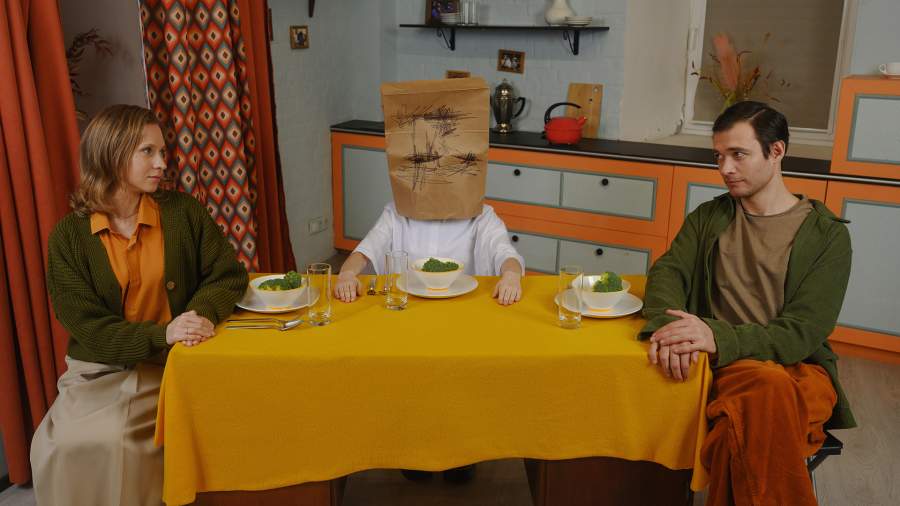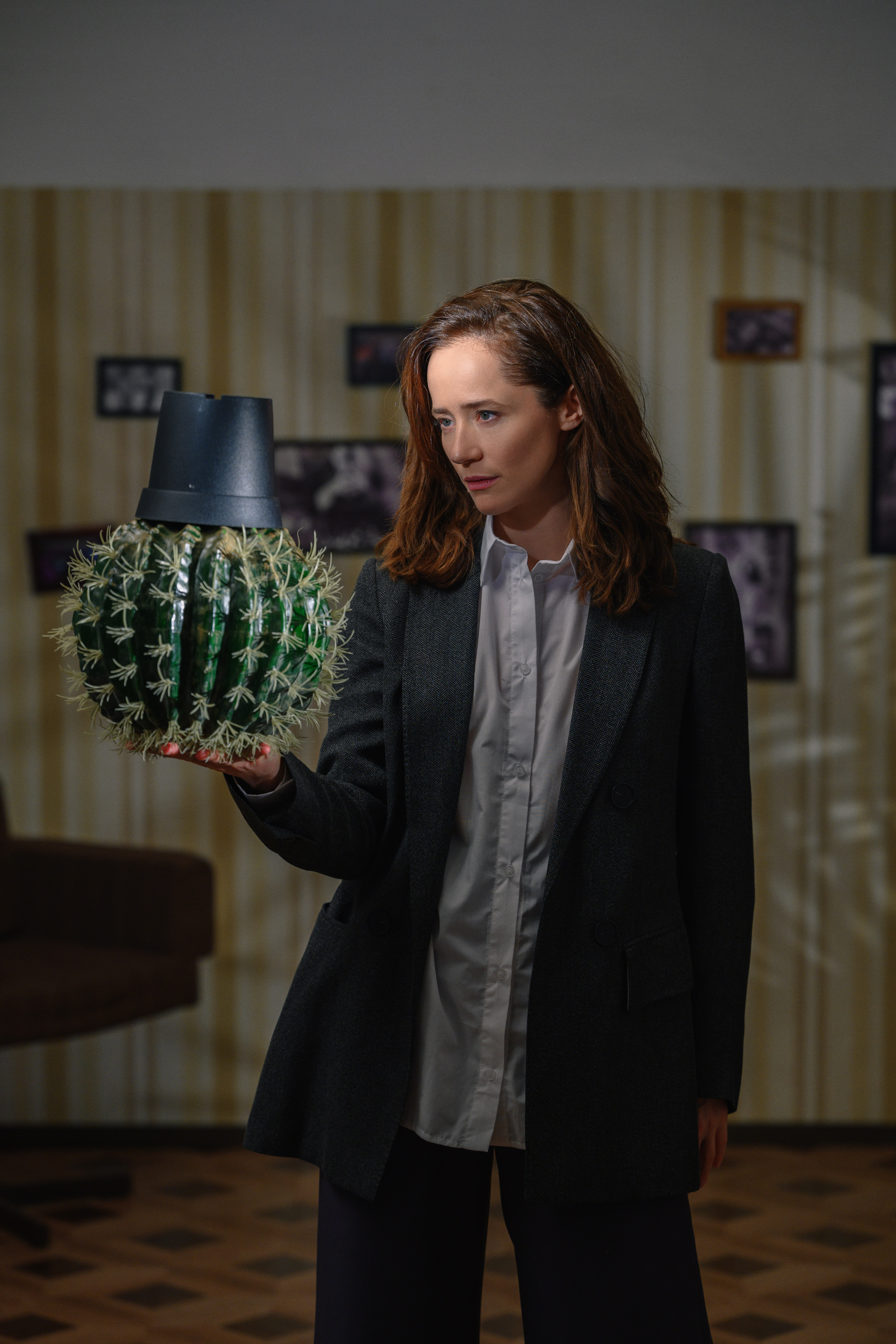The Way with a Samurai: Theater of Nations produces a play about a special child

Rahim Jafarov's high-profile novel "Sato" received a theatrical interpretation just a few years after its release. All the upcoming performances are sold out, which proves both the popularity of the novel and the relevance of the topic of special children in culture. The premiere of the play will take place on February 11, Izvestia got acquainted with the production in advance and came to the conclusion that it will not be able to replace the book, but to offer its own interesting reading - quite.
A play based on the novel by Rahim Jafarov
Like Ragim Jafarov's novel, the play "Sato" is organized a bit like a psychological (or perhaps psychiatric) detective. The protagonist, child psychologist Dasha, meets a boy named Kostya. He is five years old, convinced that he is actually space Rear Admiral Sato, who has been imprisoned in a child's body. He is attracted by the weakness of the child's body, but he reasoned as if he really professionally led combat units and punished all those who disobeyed him. However, he also punished those who obeyed him. Sato is distinguished by cold logic and rigid judgment, he sees through all adults, demonstrates the wonders of hand-to-hand combat and can make a real radio from a few wires and plastic.
Dasha needs to figure out what's going on here. The most obvious options are schizophrenia or dissociative identity disorder. True, maybe Sato does exist, and his buddies with Japanese names are coming for him soon. Or is it about something else altogether? Dasha enthusiastically engaged in the boy, deciphering the bizarre symptoms and delving into the family affairs of the family Kostya: parents on the verge of divorce, the mother - hysterical, the father cheats on her with a young lawyer, his older sister Kostya simply afraid of him, so it's time for the boy to shut down and harden.

Jafarov's novel in its first half is very strong in this intrigue, where the reader is presented with equal conviction all versions of Dasha. The development of the plot and the finale, when the novel came out, divided the literary world: not everyone was satisfied with the way the author solved his own problem. But in the fact that this is a very talented work, everyone seems to have agreed. And this is very much felt in the performance, where many of the best parts of the novel are transferred verbatim, although it is clear that 270 pages in 100 minutes can not fit in any way.
The director Philip Gurevich together with the artist Michael Gerber chose a very precise scenographic solution of the space for the action of the play. All the characters are placed in a giant torn box, where toy furniture is set up - and where there is another box, a small one, whose contents we will never see until the end. It seems to contain children's toys for Dasha's patients, but are they the only ones in there? Who can vouch for that?
So the characters are revealed to us gradually and not entirely to leave room for imagination. Not all their secrets we learn, however, it is not always necessary. Our attention is drawn to Kostya. He is played by a young actress Vera Yengalycheva, and her transitions between Sato and Kostya make the whole performance.

She filigrees her way into a confused boy. She mistrustfully squints at those around her when Sato tries to "disguise" herself. And she boldly bursts into adult conversations, exposing embarrassing secrets and demanding special attention. Yengalycheva is taller than superstars Olga Lerman (Dasha) and Nadezhda Lumpova (Kostya's mother), which creates the right psychological effect: Sato can thus literally look down on women. But when Yengalycheva needs to suddenly turn into a weak boy, it is as if she shrinks into a lump, and one cannot believe that just now she towered over her interlocutors like a giant from a distant space.
How to behave with a special child
It is clear that all these components of the performance for a large part of the audience are of much less importance than the opportunity to take a course of family therapy through the play. After all, tickets to the Theater of Nations are expensive, but perhaps one session with a good psychologist will cost no less. By the way, Dasha constantly sends Kostya's parents just to the family psychologist, and they can not afford it.

And here just the director emphasizes exactly on the damned questions: divorce or not, what to do with children, how to learn to talk through the real claims to each other, whether you can hit a child.
Then - another circle of questions related to a special child in the family. How to accept his peculiarities, how to overcome the fear of doctors, which specialist to trust, how to stop blaming him for the fact that he is not like everyone else. Whether to be afraid of medical treatment, how to separate the manifestations of his diagnosis and the consequences of the climate in the family, whether to blame each other for the fact that the child has problems, how to deal with the fact that parents shut themselves in when faced with a diagnosis, or run away from the family.
Who would argue that these are important issues? As well as the fact that almost one in four families today have children with some kind of difficulty, so they have to answer all these questions on a daily basis? It's great that there's a play that, like, for example, the most popular Wonder Boy (it still exists in the form of the movie "Wonder Boy"), speaks about the pressing issues. It's bad enough that the intrigue is lost, and instead of further wondering who Sato is, we get caught up in problem solving.
All the more so because there will be nothing new here for parents of special children, and those who don't have such children are unlikely to be able to put themselves in their shoes anyway. Both the play and the novel failed to cope with this nerve, so even the finale in "god out of the car" mode didn't help until the end. Perhaps Dzhafarov managed to keep the balance a little better than Gurevich, but at some point the viewer, even on a short run, begins to feel fatigue. The play was staged and performed perfectly, but the material is just too difficult: a step to the left or to the right is dissonance, if not a lie, and no one really knows where the truth is.

What to do about it is not very clear. A fine Moscow diagnostician once remarked to desperate parents that if they begin to understand what is going on in the head of their schizophrenic child, it will mean that they have the same diagnosis. But it is also impossible not to understand what is going on in his head, as well as to pretend that these are "temporary difficulties", as Ivan Okhlobystin's character in the scandalous movie proclaimed. Theater, like cinema and literature, is now persistently exploring this territory, taking risks and losing somewhere. But in the audience's memory, Rear Admiral Sato will still remain a bright meteor that came from a galaxy far, far away to illuminate the darkness in which immature and not so mature souls wander.
Переведено сервисом «Яндекс Переводчик»
